Our editors independently select these products. Making a purchase through our links may earn Well+Good a commission
The ultimate bedtime routine for deeper sleep—and a more energized a.m.
Experts share science-backed hacks that you can try tonight for deeper sleep and a more energized morning.
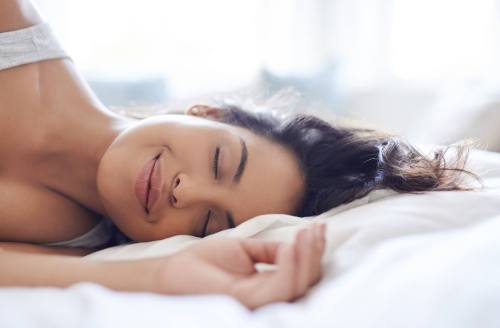
Sacrificing zzz’s in exchange for waking nights (or working, more feasibly) is—finally!—being recognized as the health hazard it is. And not a moment too soon: Study after study shows that poor sleep is linked to a slew of health issues, from depression and anxiety to chronic inflammation, diabetes, and obesity.
Scary, I know—especially if you’re one of the many hyper-connected Americans whose pace of life is bordering on “breakneck.” So, realistically, what can a busy gal do to encourage more healing REM moments?
Well, just like your morning routine sets the tone for a productive day, a well-planned evening routine can make a huge difference in the quality of your shut-eye. “Having a regular sleep routine trains the brain to get the message that it’s time to simmer down,” says Mary Purdy, MS, RDN, a coach and clinical education lead for Arivale’s futuristic wellness program. The key, she says, is consistency.
Here, experts share some of the best (and easiest!) ways to sharpen your resting potential before your head hits the pillow. Yes, this bedtime ritual may require you to give up some of your current p.m. pastimes, like scrolling through Insta or watching Friends reruns. But isn’t the prospect of a more energized a.m. totally worth a little less Tribbiani time?
Read on for the 5-step bedtime routine that’ll transform your sleep, according to experts.
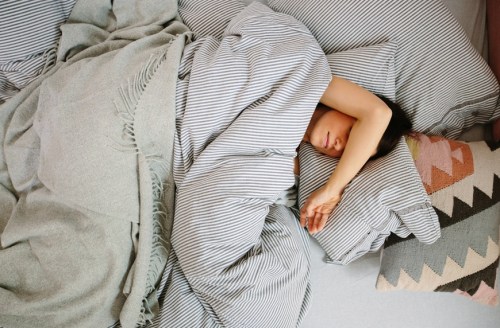
Create a cooling sleep cocoon
Upgrading your sleep environment—or your “sleep hygiene” as Harvard Medical School refers to it—can be hugely important to the quality of rest you’re clocking. And it all starts with your bedding, says Purdy: “Liking one’s bed, sheets, and pillows is essential.” It’s important that you don’t get too hot at night, so seek out temperature-controlled bedding that can help keep you in the slumber zone.
You should also check your thermostat before turning in. “A normal trigger for the onset of sleep is a drop in body temperature,” Purdy notes, adding that 60º-67º is the optimal room temperature for reaching REM. Sleep scientist and biometrics expert Lorenzo Turicchia seconds that. “Our body temperature needs to drop by 2ºF for us to fall asleep, and being in a high-temperature room makes this process more difficult,” he says. Investing in temperature-controlled furnishings like BedGear’s cloudlike performance mattresses and pillows designed to dissipate spikes in heat could make a notable difference in your body’s ability to remain at rest. Even their Ver-Tex sheets and blankets provide a strangely satisfying sensation of being wrapped head-to-toe in silky Calvin Klein undergarments.
And what can make your current setup feel chillier, naturally? Taking a hot bath in the evening can trick your body into its “cooling off” period more rapidly, which encourages deeper sleep. (Bonus relaxation points if you add a scoop of Epsom salts.)

Experiment with aromatherapy
Nighttime’s also the right time to break out your essential oil collection. But where to begin? “Lavender and Roman chamomile are known to soothe the mind and support the breath by having a significant effect on calming the central and autonomic nervous system,” says Eileen Feighny, certified aromatherapist and founder of Tulura skin care.
For a dose of stress-reducing pulse-point action, Palermo Body’s pretty blue rollerball of Tranquility Aromatherapy Oil offers a chic bedside accessory—whether you’re at home or in a hotel room. “It’s super easy to throw in your bag and grab when you’re anxious and on the go,” says Feighny. “I keep one by my nightstand to apply on my temples before bed when I’m winding down.”
You can also choose to fire up a diffuser before bed. Feighny counts the Vitruvi Stone model as one of her favorites, but there are tons of options to satisfy any budget or aesthetic.
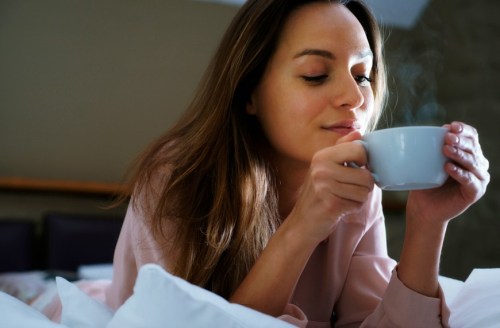
Schedule after-hours tea time
If your preferred sleep aid is a big glass of merlot, you might want to think twice. “Alcohol can have a negative impact on sleep quality,” says Purdy. “While it may help someone drift off, it reduces REM sleep, the type that is most restorative.” Instead, opt for herbal teas, which “can actually have calming or ‘nervine’ effects before bed,” Purdy claims.
Brooke Alpert, RD, author of The Diet Detox, fully believes in this ritual. “I love talking to clients about ‘sleep foreplay,’” she says. She recommends taking a magnesium supplement with a cup of Pukka’s Night Time tea. “It’s organic—and not bitter at all!”
Or, for those interested in the supplement of the moment, hemp-derived CBD is said to help soothe nerves. “CBD is a non-psychoactive cannabinoid associated with numerous health and wellness benefits,” explains Cindy Capobianco, co-founder of Lord Jones. “Using a CBD tincture or taking a CBD gumdrop an hour before bed enables many of our clients to unwind and sleep more soundly through the night.” Pinkies up.
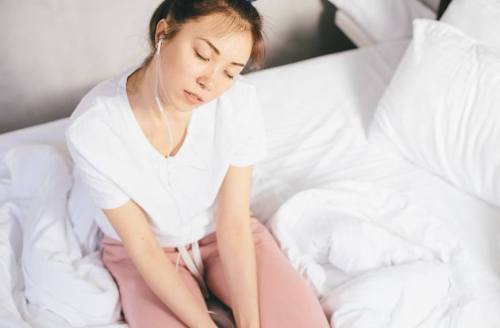
Hit play on a guided sleep meditation
While sleep improvement apps are already gaining favor with celebs like Nicole Kidman, touch-of-a-button options for bedtime yoga and guided meditations are accessible (and basically free) for all. “There are dozens of amazing online yoga options, as well as meditation apps that can be incredibly effective tools for prepping the body and brain for sleep,” Purdy says.
Some evening yoga routines, like the ones on the Yoga Wake Up app, can be performed right from your bed to help you stretch and release the worries of the day. The Omvana meditation app can also lull you into a slumber at night, while listening to guided sleep suggestions throughout the day can stimulate just the kind of mindful preparation Purdy encourages.
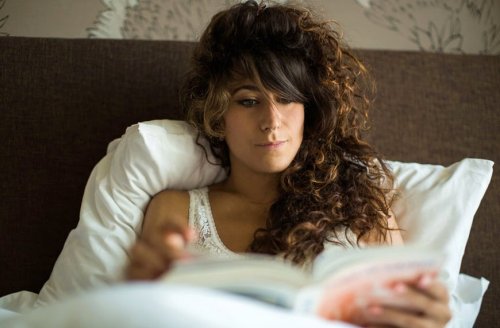
Swap blue light for white noise
Now, for the bad news: The blue light emitted from tech devices really does disrupt sleep patterns. “One of the biggest influencers on sleep is light,” explains Purdy. “For the later hours of the evening, working in dimmer light and logging off your electronics two hours before bed can be helpful.” And for those nights when you truly can’t shut down your email until lights-out, Purdy recommends downloading F.lux onto your device. “It helps to temper down the blue light emissions,” she says.
To drift away even faster, swap blue light for a wash of white noise.“Our hearing is used as an alarm system to protect us when we’re asleep—white noise can mask those sounds that wake us up,” Alpert says. She’s a sucker for the $1 White Noise App that actress Nina Dobrev recently touted, though the options are endless—oscillating fans, ocean waves, whale songs, cats purring. “What’s most important is to find what sound works best for you,” she says. Gentle sound of a spin bike whirring, anyone?
If Charlie horses are cramping your after-dark style, this household item may serve as an unexpected remedy. Just make sure not to get too *much* sleep—that, too, can be bad for your health.
Sign Up for Our Daily Newsletter
Get all the latest in wellness, trends, food, fitness, beauty, and more delivered right to your inbox.
Got it, you've been added to our email list.










